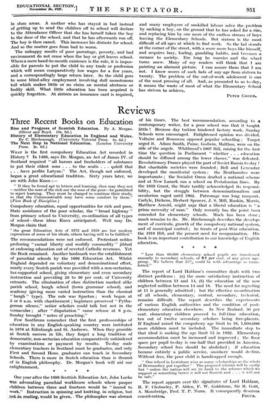One year after the 1696 Scottish Education Act, John Locke
Wag advocating parochial workhouse schools where pauper children between three and fourteen would be " inured to work." Instruction in spinning and knitting, in religion, but Mt in. reading, would be given, - The philosopher was abreast of his times. The best recommendation, according to a contemporary writer, for a poor school was that it taught
little ! Because day tuition hindered factory work, Sunday Schools were encouraged. Enlightened opinion was divided. Voltaire and Rousseau opposed popular schooling ; Turgot urged it. Adam Smith, Paine, Godwin, Malthus, were on the side of the angels. Whitbread's 1807 Bill, raising for the first time the question in Parliament " whether . . . education should be diffused among the lower classes," was defeated. Revolutionary France played the part of Soviet Russia to-day ! But charitable societies were founded ; Bell and Lancaster developed the monitorial system ; the Benthamites were importunate ; the Socialist Owen drafted a national scheme and at New Lanark ran a school on Pestalozzian lines. By the 1833 Grant, the State tardily acknowledged its responsi- bility, but the struggle between denominationalism and secularism raged until 1902. Patronage was long rampant. Carlyle, Dickens, Herbert Spencer, J. S. Mill, Ruskin, Morris, Matthew Arnold, might urge that a liberal education is " a prime necessity of man." Only recently has the point been conceded for elementary schools. Much has been done ; much remains to do. Mr. Birchenough describes the develop- ment of curricula, growth of the compulsory national system, and of municipal control ; he treats of post-War education, the 1918 Bill, and the present need for reorganization. His book is an important contribution to our knowledge of English education. * *






















































 Previous page
Previous page